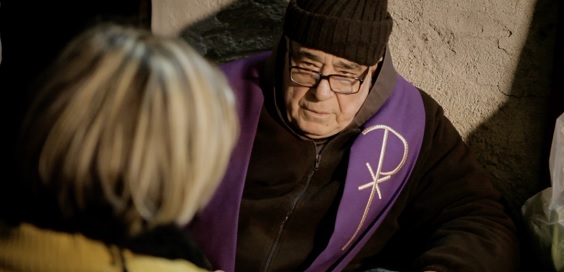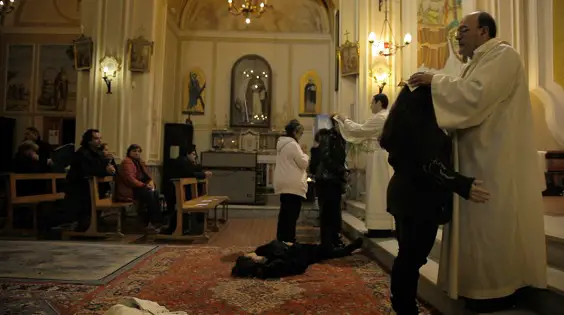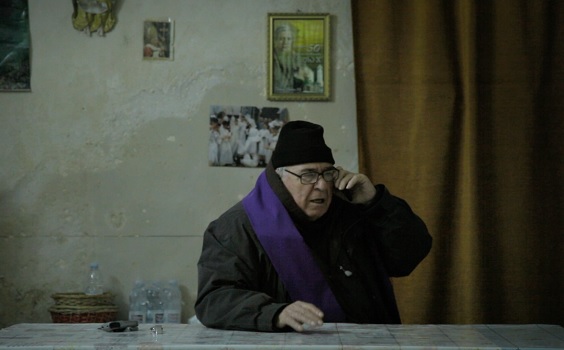Deliver Us (2016) – Film Review

Director: Federica di Giacomo
Certificate: 15
by Gregory Fishwick
Demonic possession and, ergo, exorcisms are, apparently, on the rise. Federica Di Giacomo’s documentary feature informs us that all French dioceses have now at least one exorcist installed. The Madrid archdiocese is apparently frantically searching for another seven to fill some vacant spots. In the US, the number of exorcisms has increased tenfold whilst in Milan and Rome, the number of exorcists has gone up from 6 to 12, with the church putting an emergency call centre into place. Deliver Us (Liberami) follows a handful of the men of the cloth with this apparent gift of casting out evil, as well as some of those, apparently, afflicted.
This is a very real, modern world we are given a glimpse into. Don’t expect darkened rooms, condensed breath, green vomit and spinning heads – the act of exorcism that we see here is on a par with a visit to the doctor. The afflicted are regular folk whose satanic moments come upon them like a flaring up of rheumatism and to the exorcists; it’s business as usual.
Particular focus is put on Father Cataldo, a noted exorcist in Palermo. A veteran priest who mixes up his clerical garments with a fleece and woolly hat, his Tuesday “Mass of Liberation” has the feel of an autograph signing; the devoted jostling to meet their hero. Again, though, there is a pervading sense of normality to the proceedings. The “possessed” make their regular visits here in hope their ailment will be cured, though, as with the regular patient making their weekly visit to the doctor’s waiting room, there is almost a sense of perverse pride in their misfortune.
“Moments that provoke”
Aiding Fr. Cataldo in his work is an ageing pedant and an elderly lady whose blend of brutal pragmatism and sycophancy gives her the air of the doctor’s receptionist. There’s even the insufferable cured one who still regularly returns and lauds it over the other “patients.”
However, there is no sense of cynicism on behalf of the film-makers, merely objective observation. Any question of faith is almost by-the-by for the viewer, as, indeed, it is for some of the participants. Whether the exorcists are true men of God who genuinely want to help their flock, or whether the afflicted are delusional, desperate schmucks being cynically manipulated or suckered is up to the viewer.
There are certainly moments that provoke; there is pause and reflection (a wayward youth speculating that belief has nothing to do with it as he’s never been a believer and yet is still possessed and frequently begs the priest for his help), intrigue (a “cured” young woman’s relapse in a church; it is then revealed to us, she has a penchant for mediumship), minor shock (the inevitable drooling, gnashing of teeth and writhing on the floor) and even laughter (Fr. Cataldo conducts two exorcisms over a cell phone and another priest asks the relative of one of the possessed to go and pray in the corner because her hysterical incantations are distracting him from the business of the exorcism of her loved one.)
“Quiet struggle and perseverance”
Horror fans should perhaps be forewarned that there is no sense of terror here, these people’s stories are tales of quiet struggle and perseverance. They are also human stories; the afflicted are all too recognisable types in as that they are not types; from the married woman of 25 years discussing going to dance classes with her hairdresser and most definitely without their husbands to the coke snorting chav, these are people we know and to see them supposedly cursed with such an alien malady makes for curious viewing.
For her part, Di Giacomo wisely leaves all questions unanswered, including the key one of whether demonic possession is real or not. Again, that question is almost negligible; this is a piece about people and otherworldly matters told in a very worldly way.
7/10











